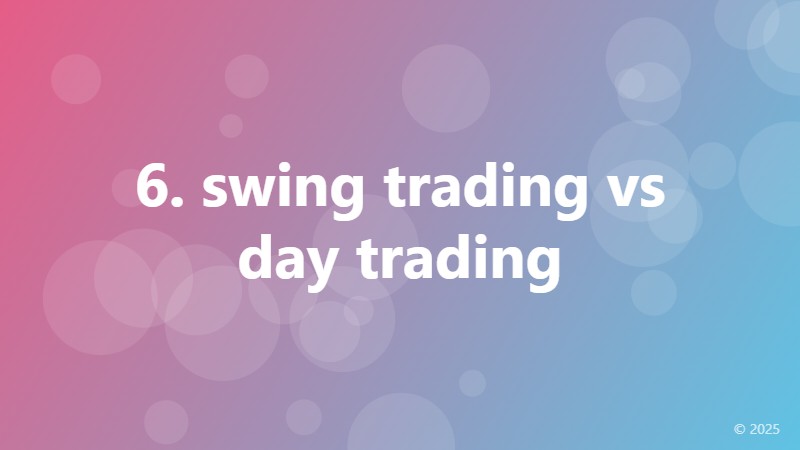6. swing trading vs day trading

Understanding the Difference Between Swing Trading and Day Trading
When it comes to trading, there are various strategies that traders employ to maximize their profits. Two popular trading strategies that are often confused with each other are swing trading and day trading. While both strategies involve active trading, they differ significantly in terms of their approach, duration, and risk management. In this article, we'll delve into the world of swing trading vs day trading, highlighting their differences and helping you decide which strategy suits you best.
What is Swing Trading?
Swing trading is a medium-term trading strategy that involves holding positions for a longer period than day trading, typically ranging from a few days to several weeks. Swing traders aim to capitalize on the short-term price movements of a stock or security, often riding the waves of market fluctuations. This strategy requires a deeper understanding of technical and fundamental analysis, as well as market trends and sentiment.
What is Day Trading?
Day trading, on the other hand, is a short-term trading strategy that involves buying and selling financial instruments within a single trading day. Day traders typically close out their positions before the market closes, avoiding overnight risks and leveraging the volatility of the market. This strategy demands a high level of discipline, focus, and quick decision-making, as day traders need to react rapidly to changing market conditions.
Key Differences Between Swing Trading and Day Trading
So, what sets swing trading apart from day trading? Here are the key differences:
- Duration: Swing trading involves holding positions for a longer period, while day trading involves closing out positions within a single trading day.
- Risk Management: Swing traders often set wider stop-losses and take-profit targets, whereas day traders use tighter stop-losses and focus on quick profits.
- Trading Frequency: Swing traders typically trade less frequently than day traders, who may execute multiple trades within a day.
- Market Analysis: Swing traders focus on medium-term market trends and sentiment, while day traders rely on short-term charts and technical indicators.
- Time Commitment: Swing traders require a less intense time commitment compared to day traders, who need to monitor the market constantly.
Which Strategy is Right for You?
Ultimately, the choice between swing trading and day trading depends on your personal preferences, risk tolerance, and trading goals. If you're looking for a more relaxed approach that allows for deeper analysis and market understanding, swing trading might be the way to go. However, if you thrive in fast-paced environments and are comfortable with rapid decision-making, day trading could be your cup of tea.
Remember, both strategies require discipline, patience, and practice to master. It's essential to understand the pros and cons of each approach and develop a trading plan that suits your unique needs and goals.
By grasping the differences between swing trading and day trading, you'll be better equipped to navigate the world of trading and make informed decisions that drive your success.